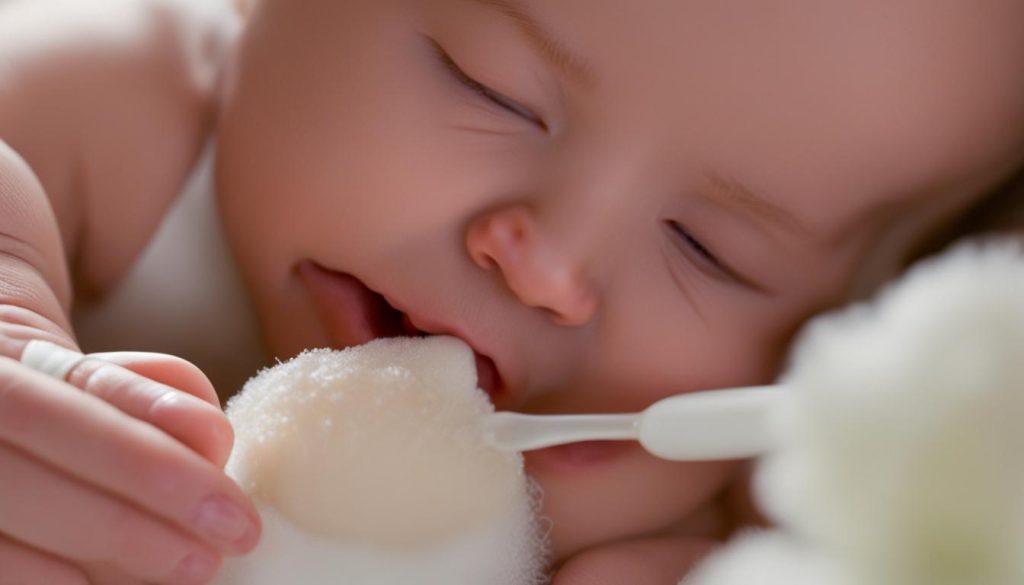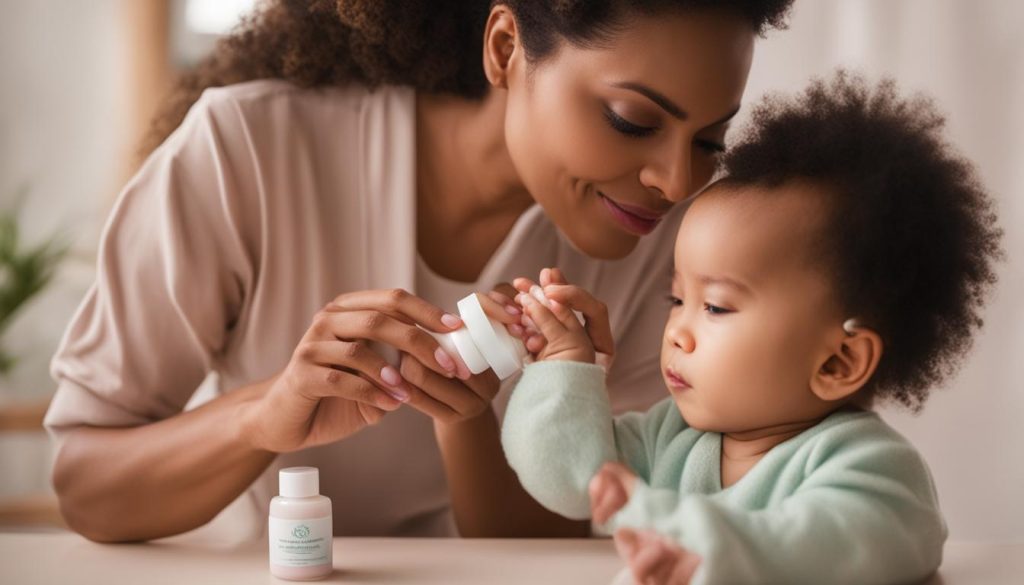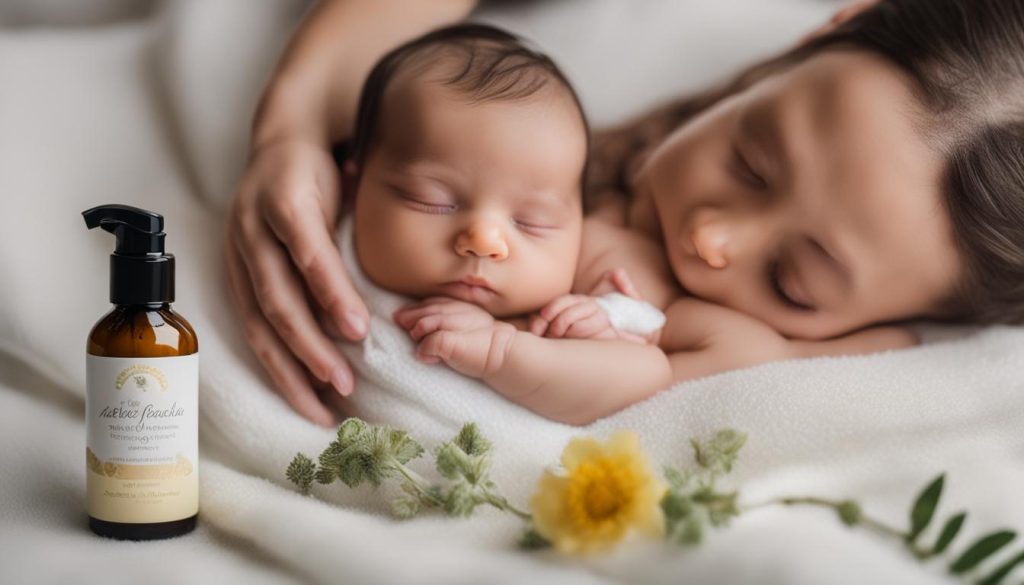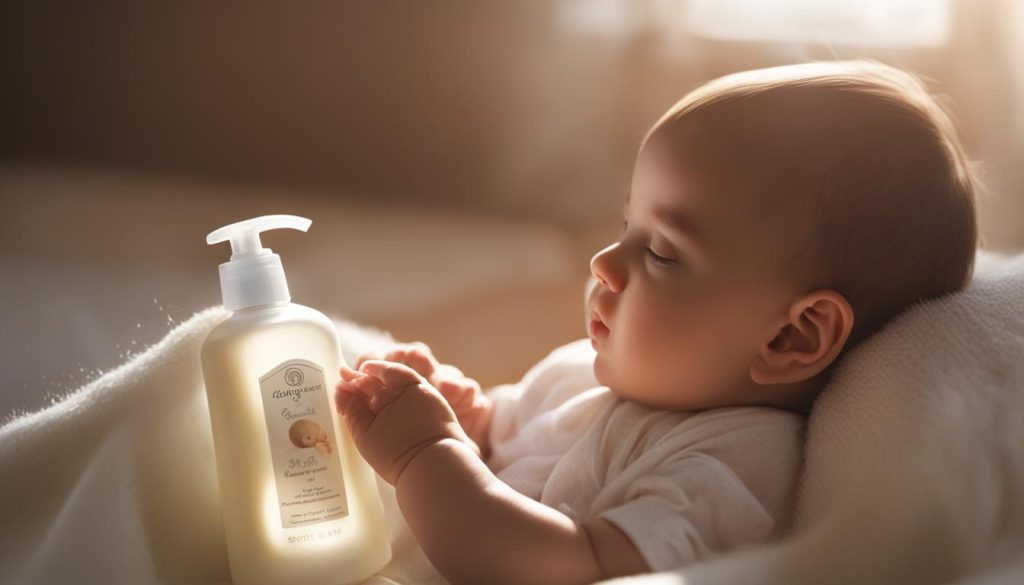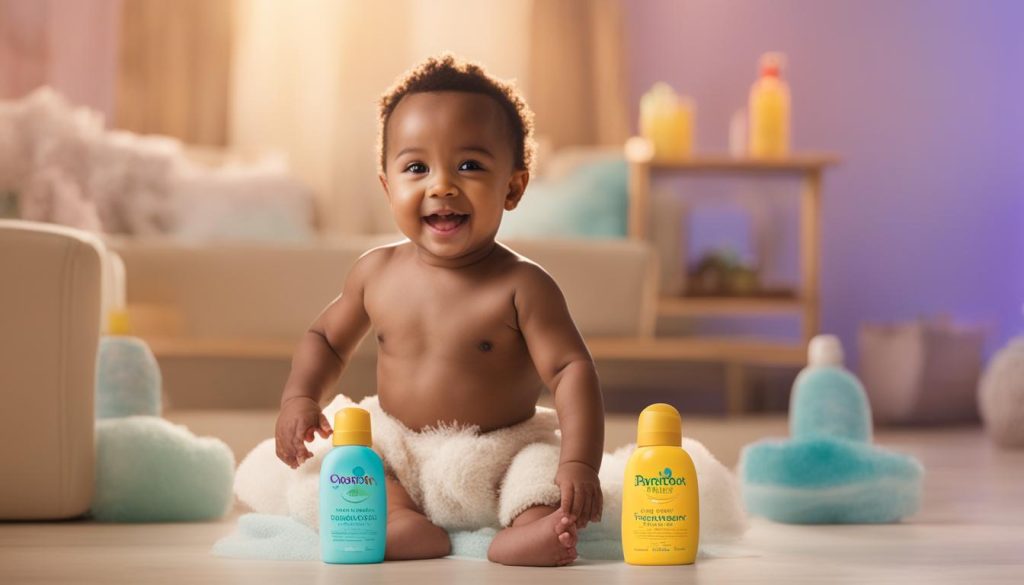Caring for a newborn’s delicate skin is crucial for their overall well-being. In this article, I will explore the importance of lotion in infant skincare and provide essential tips for using lotion on newborns. As a parent, you want nothing but the best for your little one, and that includes taking care of their sensitive skin.
Newborns have thinner and more sensitive skin than older children and adults. Their skin is prone to dryness and irritation, which is why it’s important to understand the unique characteristics of newborn skin.
Safety is paramount when using lotion on newborns, so consulting with a pediatrician for personalized advice is recommended. Choosing lotions specifically formulated for newborns and avoiding strong fragrances can help prevent any potential allergic reactions. Furthermore, it’s crucial to choose the right lotion for your baby, considering their sensitive skin. Gentle, fragrance-free, and hypoallergenic lotions are the best choices.
While selecting the right lotion is important, it’s equally crucial to be aware of harmful ingredients commonly found in baby lotions. Artificial fragrances, dyes, parabens, and other harsh chemicals can cause irritation and should be avoided. Opting for lotions that are free of these ingredients ensures the safety and well-being of your newborn’s delicate skin.
On the other hand, there are beneficial ingredients to look for in baby lotions. Shea butter, colloidal oatmeal, glycerin, olive oil, and aloe vera are known for their moisturizing and soothing properties. These natural ingredients can nourish and protect your baby’s delicate skin.
Dryness is a common issue in newborns due to their thinner skin barrier. Understanding the causes of dry skin, such as cold temperatures or low humidity, can help parents address this issue effectively.
Now, you may wonder if it’s okay to put lotion on your baby. The answer is yes! Moisturizing baby skin is an important part of a skincare routine, as it helps keep the skin hydrated and healthy. Following proper moisturizing techniques, such as applying a small amount of fragrance-free lotion to your baby’s still-damp skin after a bath, can help lock in moisture and prevent dryness.
Aside from moisturizing, there are other ways to keep your baby’s skin healthy. Avoiding bubble baths, using gentle soap and non-soap cleansers, and using organic cotton clothing and bedding can all contribute to maintaining your baby’s soft and healthy skin.
When it comes to bathing and skincare for newborns, it’s essential to follow proper techniques. Sponge baths are recommended until the umbilical cord falls off or a boy’s circumcision heals. Once these milestones are reached, tub baths can be given following the appropriate bathing techniques.
Lastly, proper skincare for newborns includes using baby-specific products, avoiding powders, and being aware of potential skin rashes and irritations. Selecting laundry detergents carefully is also important to prevent skin irritation.
By following these essential tips, you can ensure that your newborn’s skin is well-nourished, moisturized, and protected, giving them the best start in their skincare journey.
Understanding Newborn Skin
Newborns have delicate and sensitive skin that requires special care and attention. Understanding the unique characteristics of newborn skin is essential for parents to provide proper skincare and prevent any potential issues. Here are some key factors to consider:
Sensitive Skin
Newborn skin is incredibly sensitive and prone to dryness and irritation. The outer layer of their skin is thinner compared to adults and older children, making it more susceptible to allergens and irritants. It’s crucial to choose skincare products specifically formulated for newborns to minimize the risk of adverse reactions.
Moisturizing
Keeping newborn skin adequately moisturized is essential for maintaining its health and preventing dryness. Newborns have a higher rate of moisture loss from their skin, so using a gentle and fragrance-free moisturizer can help replenish and retain moisture. Look for lotions that are formulated for sensitive skin and contain ingredients like shea butter, glycerin, or colloidal oatmeal, known for their moisturizing properties.
Skincare Routine
Establishing a regular skincare routine for your newborn can help keep their skin healthy and protected. Avoid using harsh soaps or excessive bathing, as this can strip the skin of its natural oils and lead to dryness. Instead, opt for mild cleansers and limit baths to a few times a week. After bathing, gently pat the skin dry and apply a moisturizer on damp skin to seal in moisture.
By understanding the unique characteristics of newborn skin and following a gentle skincare routine, parents can help maintain their baby’s skin health and prevent any discomfort or issues.
Safety when Using Lotion on Newborns
When it comes to using lotion on newborns, ensuring their safety should be a top priority for parents. While lotion can provide moisture and nourishment to a baby’s delicate skin, it is important to follow certain guidelines to prevent any potential risks or allergic reactions.
One of the first steps in ensuring safety is to consult with a pediatrician. They can provide personalized advice based on the specific needs of the baby’s skin. Pediatricians can recommend lotions that are specifically formulated for newborns, taking into consideration any potential allergies or sensitivities.
Choosing lotions that are fragrance-free is also recommended. Strong fragrances can be irritating to a baby’s sensitive skin and may increase the likelihood of an allergic reaction. Opting for gentle and hypoallergenic lotions can help minimize any potential risks.
Parents should also be vigilant for any signs of allergic reactions when using lotion on newborns. These may include redness, rashes, or increased irritation. If any of these symptoms occur, it is important to discontinue using the lotion and seek medical advice.
| Allergic Reactions | Signs and Symptoms |
|---|---|
| Allergic Reaction | Redness, rashes, increased irritation |
| Allergic Reaction | Swelling, itching, hives |
| Allergic Reaction | Difficulty breathing or wheezing |
Overall, ensuring the safety of using lotion on newborns involves consulting with a pediatrician, choosing the right fragrance-free lotion, and being aware of any signs of allergic reactions. By following these guidelines, parents can provide gentle care for their baby’s skin.
How to Choose the Right Lotion
When it comes to selecting a lotion for your newborn, it’s essential to consider their sensitive skin’s unique needs. Choosing the right lotion can help keep your baby’s skin moisturized and protected. Here are some important factors to consider:
1. Ingredients
Look for lotions that are gentle and specifically formulated for newborns. Opt for fragrance-free lotions to minimize the risk of irritation. Avoid lotions with harmful ingredients such as dyes, parabens, and alcohol. Consider natural and organic options if you prefer a more gentle and hypoallergenic formula.
2. Testing
Before applying any lotion to your baby’s skin, do a patch test to ensure they don’t have an allergic reaction. Apply a small amount of lotion to a small area of their skin and wait for 24 hours to observe any signs of redness, rash, or irritation.
3. Pediatrician Recommendation
Consult with your pediatrician for personalized advice on choosing the right lotion for your newborn. They can recommend specific brands or ingredients that are suitable for your baby’s delicate skin.
Remember, every baby is unique, and what works for one may not work for another. It’s essential to pay attention to your baby’s skin and adjust the lotion accordingly if you notice any signs of irritation or dryness.
| Lotion Type | Features | Recommended Brands |
|---|---|---|
| Hypoallergenic Lotion | Gentle formula suitable for sensitive skin | Johnson’s Baby, Aveeno Baby, Cetaphil Baby |
| Natural Lotion | Free from harsh chemicals and artificial fragrances | Burt’s Bees Baby, Earth Mama Organics, California Baby |
| Fragrance-Free Lotion | Minimizes the risk of irritation | Mustela, Babyganics, Eucerin Baby |
Remember to always read the product labels and consult with your pediatrician for specific recommendations for your baby’s skin. By choosing the right lotion for your newborn, you can help keep their delicate skin moisturized, protected, and healthy.
Ingredients to Avoid in Baby Lotions
When it comes to choosing a lotion for your baby, it’s important to be aware of potentially harmful ingredients. Some ingredients commonly found in baby lotions can be irritants and may cause adverse reactions on your baby’s delicate skin. To ensure the safety and well-being of your little one, it’s crucial to avoid these harmful lotion ingredients:
- Fragrances: Artificial fragrances can be harsh and irritating to newborn skin. Look for lotions that are fragrance-free or use natural, mild scents.
- Parabens: Parabens are preservatives often used in skincare products. However, they have been linked to potential hormonal disruptions and allergic reactions. Choose paraben-free lotions for your baby.
- Dyes: Dyes can add unnecessary chemicals to a lotion and may cause skin irritation. Opt for lotions that are free from artificial colorants.
By avoiding these harmful ingredients, you can protect your baby’s delicate skin from potential irritations and reactions. Always check the ingredient list before purchasing a baby lotion, and opt for products that prioritize natural and safe ingredients.
“Choosing lotions that are free from fragrances, parabens, and dyes is essential for the well-being of your baby’s skin. These harmful ingredients can cause irritation and potentially harm your baby’s delicate skin barrier.” – Pediatric Dermatologist
| Harmful Lotion Ingredients | Potential Effects on Baby’s Skin |
|---|---|
| Fragrances | Can cause skin irritation and allergic reactions |
| Parabens | May disrupt hormones and lead to allergic reactions |
| Dyes | Can irritate the skin and cause allergic reactions |
Choosing a baby lotion that is free from harmful ingredients is vital for maintaining your baby’s skin health. Always read labels, consult with pediatricians, and prioritize lotions that are specifically formulated for newborns and do not contain fragrances, parabens, or dyes.
Ingredients to Look for in Baby Lotions
When it comes to selecting a baby lotion, there are certain ingredients that can provide additional benefits for a newborn’s delicate skin. These natural ingredients are known for their moisturizing and soothing properties, helping to nourish and protect the skin.
“Shea butter, colloidal oatmeal, glycerin, olive oil, and aloe vera are all beneficial ingredients to look for in baby lotions.”
Shea butter is a rich and creamy ingredient that deeply moisturizes the skin, leaving it soft and supple. Colloidal oatmeal, on the other hand, acts as a gentle exfoliant and helps to relieve dryness and itching.
Glycerin is a humectant that attracts and retains moisture in the skin, keeping it hydrated for longer periods. Olive oil is known for its antioxidants and anti-inflammatory properties, providing nourishment and protection to the skin.
Aloe vera is another beneficial ingredient that has soothing and healing properties. It can help calm irritated and sensitive skin, reducing redness and inflammation.
| Beneficial Lotion Ingredients |
|---|
| Shea butter |
| Colloidal oatmeal |
| Glycerin |
| Olive oil |
| Aloe vera |
When choosing a baby lotion, be sure to look for these beneficial ingredients on the product label. They can help provide the necessary hydration and nourishment that a newborn’s skin needs, keeping it healthy and protected.
Why is My Baby’s Skin Dry?
Dryness is a common concern for many parents when it comes to their baby’s skin. Understanding the causes of dry skin in newborns can help address this issue effectively. The delicate nature of a baby’s skin, along with external factors, contributes to dryness.
One of the main reasons for dry baby skin is the underdeveloped skin barrier. A newborn’s skin barrier is thinner and weaker compared to that of older children and adults. This means that moisture is easily lost from the skin, leading to dryness. Additionally, babies have a higher surface area to volume ratio, which further increases their susceptibility to dryness.
Environmental factors also play a role in causing dryness. Cold temperatures, low humidity, and dry indoor heat can all contribute to dry skin in babies. These external conditions strip the skin of its natural moisture, exacerbating dryness.
Possible Causes of Dryness in Baby’s Skin:
- Lack of fully developed skin barrier
- Higher surface area to volume ratio
- Cold temperatures
- Low humidity
- Dry indoor heat
Understanding the causes of dry skin in babies can guide parents in taking appropriate measures to address this issue. By implementing a gentle skincare routine and creating a moisturizing environment, parents can help keep their baby’s skin hydrated and healthy.
Is it Okay to Put Lotion on a Baby?
Moisturizing baby skin is an essential part of a newborn skincare routine. It helps keep the delicate skin hydrated and protected. But when exactly is it okay to put lotion on a baby?
According to pediatricians, it is safe to use lotion on a baby, even newborns, as long as you choose a gentle and suitable product. Newborn skin tends to be more sensitive and prone to dryness, so using a moisturizing lotion can help maintain its health and prevent discomfort.
When deciding to apply lotion on your baby, it is recommended to choose a lotion specifically formulated for newborns. These lotions are usually free of harsh chemicals, fragrances, and allergens that could potentially irritate your baby’s skin. Opting for natural and hypoallergenic options can provide a gentle and moisturizing experience.
It’s important to incorporate lotion application into your baby’s skincare routine, especially after bathing. After a bath, gently pat your baby’s skin dry and apply a small amount of fragrance-free moisturizer while their skin is still damp. This helps lock in moisture and prevent dryness. Remember to consult with your pediatrician if you have any concerns or questions about using lotion on your baby’s skin.
How to Moisturize a Newborn’s Skin
Moisturizing a newborn’s delicate skin is an essential part of their skincare routine. By following simple techniques and applying lotion after a bath, you can help prevent dryness and keep your baby’s skin soft and healthy.
One effective technique is to apply a small amount of fragrance-free moisturizer to your baby’s still-damp skin after a bath. This helps to lock in moisture and create a protective barrier on the skin. Gently massage the lotion into the skin, focusing on areas prone to dryness, such as the face, elbows, and knees. Remember to choose a lotion specifically formulated for newborns, as it will be gentle and free from potentially harmful ingredients.
To further prevent dryness, it’s important to keep baths short and infrequent. Excessive bathing can strip the skin of its natural oils, leading to dryness. Additionally, using lukewarm water instead of hot water helps to preserve the skin’s moisture. Following pediatric recommendations for bath frequency and water temperature is crucial for maintaining your baby’s skin health.
In summary, moisturizing a newborn’s skin involves applying lotion after a bath and following proper bathing techniques. By using a gentle, fragrance-free moisturizer and avoiding excessive bathing, you can help prevent dryness and keep your baby’s skin nourished and protected.
Other Ways to Keep Baby’s Skin Healthy
In addition to moisturizing, there are several other practices that can help keep your baby’s skin healthy and free from irritation. By following these tips, you can create a safe and nurturing environment for your little one.
Avoid Bubble Baths
Bubble baths may be fun for older children, but they can cause dryness and irritation in a baby’s sensitive skin. The harsh chemicals and fragrances in bubble bath products can strip the natural oils from your baby’s skin, leading to dryness and discomfort. Instead, opt for a gentle soap or non-soap cleanser specifically formulated for babies.
Choose Baby-Friendly Laundry Products
The laundry detergents and fabric softeners you use can have a significant impact on your baby’s skin. Harsh chemicals and fragrances in these products can cause allergic reactions and irritation. To avoid these issues, opt for baby-friendly laundry products that are hypoallergenic and free from harsh chemicals and fragrances. Washing your baby’s clothes separately from the rest of the family’s laundry can also help prevent potential irritants from coming into contact with their skin.
Prevent Diaper Rash
Diaper rash is a common issue for babies, but there are steps you can take to prevent it. Change your baby’s diaper frequently to keep their skin clean and dry. Use a barrier ointment or cream with each diaper change to protect their skin from moisture and irritation. Additionally, using organic cotton diapers and wipes can help reduce the risk of diaper rash, as they are less likely to contain harsh chemicals and irritants.

Opt for Organic Cotton Clothing
The clothing your baby wears can also affect their skin health. Organic cotton clothing is a great choice for babies, as it is free from pesticides and other chemicals that can cause irritation. Organic cotton is also breathable and gentle, making it a comfortable option for your baby’s delicate skin. When shopping for baby clothes, look for the GOTS (Global Organic Textile Standard) certification to ensure that the clothing meets strict organic standards.
Bathing and Skin Care for Newborns
Proper bathing and skin care practices are essential for ensuring the health and well-being of newborns. Understanding the techniques for sponge baths and tub baths, as well as following appropriate bathing guidelines, can help parents provide a safe and comfortable bathing experience for their little ones.
Sponge Baths
During the early weeks of a newborn’s life, sponge baths are recommended until the umbilical cord falls off or a boy’s circumcision heals. Sponge baths are a gentle and effective way to clean the baby’s body while avoiding any potential discomfort or harm. Here are the steps for giving a sponge bath:
- Prepare a warm, clean space for the bath, ensuring that everything you need is within reach.
- Undress the baby, leaving only the diaper on, and wrap them in a towel or blanket to keep them warm.
- Using a soft cloth or sponge, dampen it with warm water and carefully cleanse the baby’s face, neck, hands, and diaper area.
- Pay extra attention to the folds of the baby’s skin, as these areas are prone to collecting dirt and moisture.
- Gently pat the baby dry with a soft towel and dress them in clean clothes.
It’s important to note that sponge baths should be given in a warm room to prevent the baby from getting cold. Additionally, always keep an eye on the baby during the bath to ensure their safety.
Tub Baths
Once the umbilical cord has fallen off and a boy’s circumcision has healed, tub baths can be introduced. Tub baths provide a more immersive bathing experience and allow the baby to enjoy the sensation of water. Here are some tips for giving a tub bath:
- Choose a baby bathtub that is safe and appropriate for the baby’s age and size.
- Fill the tub with warm water to a depth of a few inches.
- Check the water temperature using your elbow or a bath thermometer to ensure it is comfortably warm, but not too hot.
- Slowly and carefully place the baby in the tub, supporting their head and neck at all times.
- Use a gentle baby soap or cleanser to wash the baby’s body, starting from the top and working your way down.
- Rinse off the soap with warm water, ensuring no residue is left on the baby’s skin.
- Lift the baby out of the tub, wrap them in a towel, and pat them dry.
- Moisturize the baby’s skin with a gentle lotion or oil, if desired.
Remember to never leave the baby unattended during a tub bath, and always use caution and care when handling them in and out of the water.
| Advantages of Sponge Baths | Advantages of Tub Baths |
|---|---|
| Suitable for newborns with healing umbilical cord or circumcision | Provides a more immersive and enjoyable bathing experience |
| Gentle and safe for fragile newborn skin | Allows for better access to clean the entire body |
| Helps prevent water from entering the umbilical cord area or circumcision site | Enables babies to explore and become comfortable with water |
By following these bathing techniques and using gentle, baby-specific products, parents can provide their newborns with a clean and soothing bathing experience. It’s important to remember that each baby is unique, and parents should always adapt their bathing routine to suit their baby’s individual needs and preferences.
Skin Care for Newborns
As a parent, taking care of your baby’s delicate skin is essential. The right skincare routine can help maintain the health and texture of their skin. To ensure your baby’s skin is well-nourished and protected, here are some important tips to follow.
Baby-Specific Products
Using specially formulated baby skincare products is crucial for your newborn’s skin. Look for lotions that are gentle, hypoallergenic, and fragrance-free. These types of lotions are less likely to cause irritation or allergic reactions. Avoid using powders on your baby’s skin as they can be inhaled and pose a risk to their respiratory system.
Diaper Rash Prevention
Diaper rashes can be uncomfortable for your baby. To prevent them, change your baby’s diaper frequently and always use a diaper cream or ointment to create a protective barrier between the skin and moisture. Choosing diapers with good absorbency and breathability also helps in preventing diaper rashes.
Choosing the Right Laundry Detergents
When washing your baby’s clothes, select a laundry detergent that is free of harsh chemicals, dyes, and fragrances. These additives can cause skin irritation and allergic reactions. Opt for a gentle, hypoallergenic detergent specifically designed for baby clothes. It is also recommended to avoid using fabric softeners, as they can leave residue on the clothes that may irritate your baby’s skin.
By following these guidelines, you can ensure that your baby’s skin remains healthy and free from irritation or rashes. Remember that every baby’s skin is unique, so it’s important to monitor their skin for any signs of sensitivity or allergies. Consult with your pediatrician if you have any concerns or questions about your baby’s skincare routine.
FAQ
Is it safe to use lotion on a newborn?
Yes, it is safe to use lotion on a newborn as long as you choose a gentle and suitable product.
What should I look for when choosing a lotion for my newborn?
When choosing a lotion for your newborn, look for ones that are gentle, fragrance-free, and hypoallergenic. Avoid lotions with harmful ingredients such as dyes, parabens, and alcohol.
Are there any ingredients I should avoid in baby lotions?
Yes, common irritants like artificial fragrances, dyes, and parabens should be avoided in baby lotions.
Are there any ingredients that are beneficial for newborn skin?
Yes, ingredients like shea butter, colloidal oatmeal, glycerin, olive oil, and aloe vera are known for their moisturizing and soothing properties for newborn skin.
Why does my baby have dry skin?
Newborns have thinner and weaker skin barrier, making them more prone to dryness. Factors like cold temperatures, low humidity, and dry indoor heat can contribute to dry skin as well.
Can I put lotion on my baby every day?
It is recommended to moisturize your baby’s skin every day as part of a gentle skincare routine. Applying a small amount of fragrance-free moisturizer to their still-damp skin after a bath can help lock in moisture and prevent dryness.
Are there other ways to keep my baby’s skin healthy?
Yes, you can also keep your baby’s skin healthy by avoiding bubble baths, using gentle soap and non-soap cleansers, patting the baby dry after bath time, using organic cotton clothing and bedding, and paying attention to diaper rash prevention.
How often should I bathe my newborn?
Newborns only need baths 2 or 3 times a week until their umbilical cord falls off or a boy’s circumcision heals. Sponge baths are recommended during this time. Once these milestones are reached, tub baths can be given following proper bathing techniques.
What should I consider when it comes to baby skincare?
When it comes to baby skincare, it’s important to use baby-specific products, avoid powders, be aware of potential skin rashes and irritations, and carefully select laundry detergents to prevent skin irritation.

